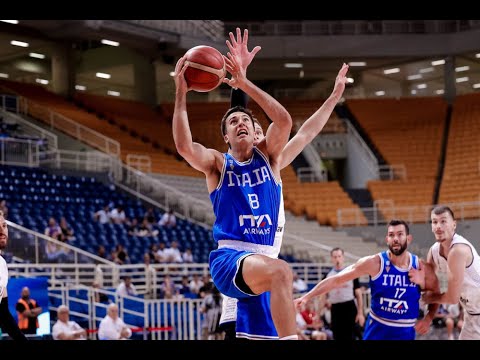The Italian national basketball team, affectionately known as the Azzurri, recently concluded their Acropolis Tournament campaign with a 74-76 loss to Greece, marking their second consecutive defeat in as many days. While the scoreboard might suggest a close contest, the underlying performance revealed a team grappling with inconsistency, fatigue, and tactical adjustments. This friendly tournament served as a crucial litmus test ahead of the much-anticipated EuroBasket, offering both valuable lessons and clear areas for improvement under the watchful eye of Coach Gianmarco Pozzecco.
A Promising Start: Early Dominance and Individual Brilliance
From the opening tip, Italy demonstrated a stark contrast to their previous outing against Latvia. The initial minutes, albeit slow with static offenses, quickly saw the Azzurri ignite, largely thanks to Simone Fontecchio`s sharp shooting from beyond the arc. His two early triples set the tone, propelling Italy to a 6-3 lead and signaling a more aggressive offensive approach. Nicolò Melli, a veteran presence, soon joined the three-point party, extending Italy`s advantage to 11-5. Despite attempts by the Antetokounmpo brothers to narrow the gap for Greece, Italy maintained a solid, cohesive performance reminiscent of their better days.
The first quarter concluded with Italy holding a comfortable 20-16 lead, a testament to their improved three-point efficiency (12/26 for the game, a notable improvement) and newfound conviction. The second quarter saw this momentum continue, fueled by the dynamic energy of Niang and a crucial block followed by a triple from Akele. Even as Greece, led by Kalaitzakis and Toliopoulos, threatened a comeback, the Azzurri responded with composure. Akele`s hook shot, Fontecchio`s free throws, and Melli`s transition play all contributed to a double-digit lead, culminating in Fontecchio`s corner three that pushed Italy to a commanding 40-30 advantage at halftime. It appeared, for a glorious moment, that the Azzurri had found their rhythm.

The Unraveling: A Third Quarter Collapse and Mounting Turnovers
However, the narrative took a dramatic turn in the third quarter. The demanding task of generating clean shots, a cornerstone of Coach Pozzecco`s strategy, began to exact its toll. Fatigue became palpably evident, leading to a significant drop in focus and execution. Italy’s offense sputtered, characterized by an alarming number of turnovers—a staggering 18 for the entire game. Greece, ever opportunistic, capitalized on these Italian miscues, initiating a devastating 13-4 run that quickly brought them back into contention at 48-43.
The momentum had decisively shifted. Katsivelis trimmed the lead to two points, and then Dorsey delivered a crucial three-pointer, giving Greece their first lead at 48-51. Italy struggled to respond collectively. Kalaitzakis further extended Greece’s advantage to a worrying +7 (50-57), as the Azzurri`s attack became entangled in a web of errors and missed opportunities. Only a spirited dunk from Niang offered a brief respite. The quarter concluded on a bitter note, with Italy trailing 52-57, facing an uphill battle to recover. It was a stark reminder that in elite basketball, even a moment`s lapse can be severely punished.

The Fight to the Finish: Character Amidst Missed Opportunities
Despite the significant deficit, the Italian squad refused to capitulate. This “never-give-up” spirit, often lauded as a hallmark of great teams, was evident in their fourth-quarter efforts. Marco Spissu, with two timely three-pointers and free throws from an unsportsmanlike foul, ignited a late rally, narrowing the gap to a mere two points (71-73) with just 1:30 remaining. The tension was palpable as Nicolò Melli launched a potential go-ahead three-pointer, only to see it clank off the rim. The final possessions became a frantic back-and-forth, a cruel seesaw of errors and squandered chances. In the dying seconds, Greece sealed their victory from the free-throw line, rendering Fontecchio’s final three-pointer a mere consolation. The game ended 74-76, a testament to Italy`s generosity and resilience, despite the defeat.
Looking Ahead: Pozzecco`s Conundrum and the Road to EuroBasket
The Acropolis Tournament, while yielding two losses, was undoubtedly an invaluable learning experience for Coach Pozzecco and his team. The challenges are clear:
- Consistency: The drastic swing between the first half`s dominance and the third quarter`s collapse highlights a need for sustained performance.
- Ball Security: 18 turnovers are simply too many against top-tier opposition, directly contributing to Greece`s comeback.
- Tactical Integration: Players like Thompson need more minutes to fully integrate into Pozzecco`s system, especially on offense.
- Gallinari`s Status: Danilo Gallinari`s continued absence, reportedly by choice, adds another layer of complexity. His experience and scoring prowess would undoubtedly bolster the squad, but his integration will need careful management.
As Italy prepares for the EuroBasket, where they will once again face Greece in their opening match in Cyprus, these exhibition games provide a realistic preview of the challenges ahead. Pozzecco faces the unenviable task of resolving defensive lapses, refining offensive sets, and making crucial roster choices. The team`s character and fighting spirit are undeniable, but true greatness, as the saying goes, lies in meticulous preparation and disciplined execution.
While the two consecutive losses might sting, they offer a clear roadmap for improvement. The Azzurri demonstrated flashes of brilliance and unwavering determination. The goal now is to transform these individual strengths and moments of cohesion into a consistent, 40-minute performance. The EuroBasket awaits, and Italy`s journey, filled with both promise and hurdles, has only just begun. The question remains: can Pozzecco mold this talented, yet sometimes erratic, squad into a formidable contender? Only time, and a lot of hard work, will tell.









